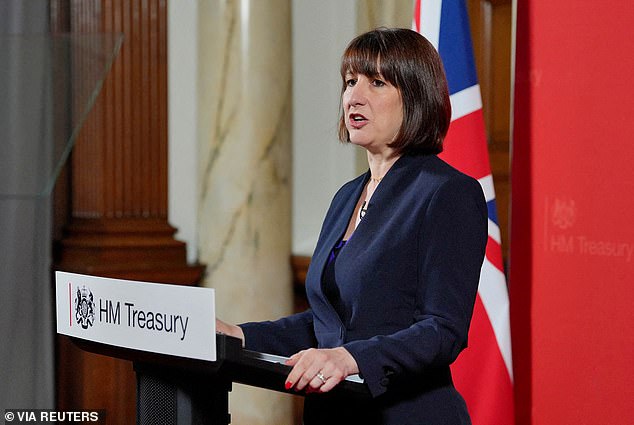Bereaved families paid £2.8bn in inheritance tax in the first four months of the financial year and more are finding themselves caught in the net.
The Treasury raised an extra 9 per cent – or £230m – between April and July compared with the same period last year, official figures revealed.
The dreaded 40 per cent death tax raised £749m in July, the second highest month on record.
Thousands of middle-class households who have lost loved ones have been forced to pay inheritance tax, as the threshold from which it must start being paid has been frozen until at least April 2028.
This means that as property prices and asset values rise, more households are dragged into paying the tax in a process known as fiscal creep.
Chancellor of the Exchequer Rachel Reeves delivers a speech at the Treasury in London on July 8

The Treasury raised an additional 9 per cent, or £230m, between April and July compared with the same period last year, official figures revealed.

The first £325,000 of inheritances is tax-free, but above that amount it is taxed at 40 per cent.
This threshold has not been increased since 2009. There is an additional allowance of £175,000 when the family home is left to “direct descendants”, such as children or grandchildren.
This deadline has also been set until 2028.
In total, HMRC collected £82.5bn last month, the highest figure ever recorded for a month of July, according to Joe Neal of tax firm Blick Rothenberg.
But the surge in inheritance revenue has revived rumours that Britain’s most hated tax could rise as Chancellor of the Exchequer Rachel Reeves tries to plug a £22bn “black hole” in the public finances.
Stephen Lowe, of retirement specialist Just Group, said: “With the Autumn Statement two months away, it seems inevitable that the Chancellor will at least apply her slide rule on inheritance tax to see if it is a way of raising more revenue.
‘We’ll have to wait and see if Rachel Reeves decides that inheritance tax can be even more beneficial to the Treasury.’

